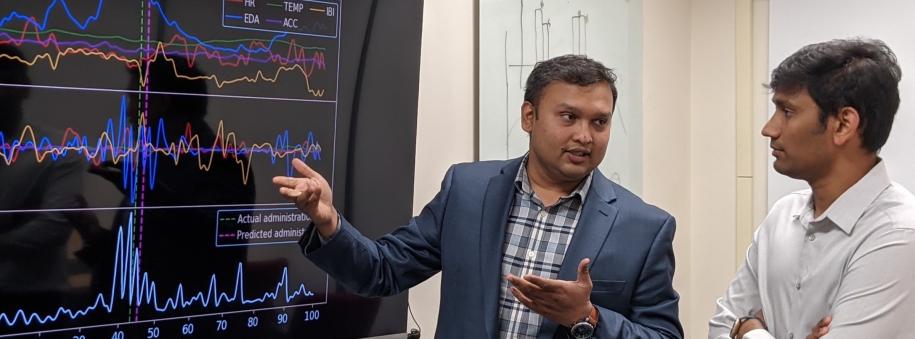Smartwatch Sensor May Help Prevent Opioid Relapse, Overdose and Dependency
Content
A research team including a University of Massachusetts Amherst computer scientist has received a $1.1 million grant to further develop a smartwatch sensor designed to support the long-term recovery of people with opioid use disorder (OUD).
Mobile sensor expert Tauhidur Rahman, assistant professor in the Manning College of Information and Computer Sciences (CICS), is collaborating with colleagues at Syracuse University and SUNY Upstate Medical University on the project, funded by the National Science Foundation’s Smart and Connected Health program.
“We have the technology to detect these craving moments and incorporate an intervention to avoid scenarios of drug use,” says Rahman, who focuses on creating mobile, health-related sensors in the MOSAIC Lab he co-directs.

The tiny, wireless sensor uses machine learning to determine if the psychophysiological signs detected in real time by respiration and electrocardiogram (ECG) are consistent with opioid cravings. Such cravings are one of the primary causes of OUD relapse and fatal overdose following a period of abstinence.
Once a craving is detected, the sensor alerts the user with mindfulness-based interventions that ultimately could be personalized based on the user’s behaviors and input from their clinician.
“Nothing like this exists today,” Rahman says, “and we believe that mobile technologies can provide an effective mechanism for people with addiction to monitor their condition and manage their cravings better.”
The current project evolved from research published in 2019 by Rahman, lead author Bhanu Teja Gullapalli — a PhD student working in Rahman’s lab — and others on the use of cardiac and respiratory signals to sense cocaine craving, euphoria and drug-seeking behavior.
More recently, in September, the researchers published a paper in Proceedings of the ACM on Interactive, Mobile, Wearable and Ubiquitous Technologies on tracking opioid use with a wearable device and developing predictive models using machine learning. They monitored 36 hospitalized patients who received opioid medication for acute pain as part of their care. The patients wore a wrist sensor that continuously measured physiological signals.
The machine-learning aspect of the research involves conducting a series of mathematical processes called convolution. “Once we run convolution, we extract features of the raw data and then train neural networks that can automatically learn to see the physical characteristics and physiological trends that indicate opioid use,” Rahman explains. “So, just by looking at a watch and monitoring a few parameters, we can tell when someone has taken an opioid. We have 80 percent accuracy on a high level with our current form of technology.”
The research can be expanded to include other substance use disorders, and the NSF-funded project includes a machine-learning course for clinicians and educational and awareness workshops for middle-school girls.
Gullapalli notes that the sensor under development could also be used to ensure the proper use of prescribed opioid pain medications and prevent OUD. “The doctor can ask the patient to wear the smartwatch and the system will track how frequently the patient is using the drug, how the patient’s physiology is changing and determine if the patient is developing a dependence on opioids,” explains Gullapalli, who was recently accepted into Yale's highly selective Innovation to Impact program for entrepreneurship for substance use disorder, funded by the National Institute on Drug Abuse.
The goal of the NSF project is to advance and validate the innovative technology. “Successful execution of the research will begin to test the effectiveness of integrating passive sensing, adaptive artificial intelligence (AI) and mindfulness interventions on regulating drug craving,” the grant summary concludes.
Originally published by the UMass Amherst Office of News and Media Relations.